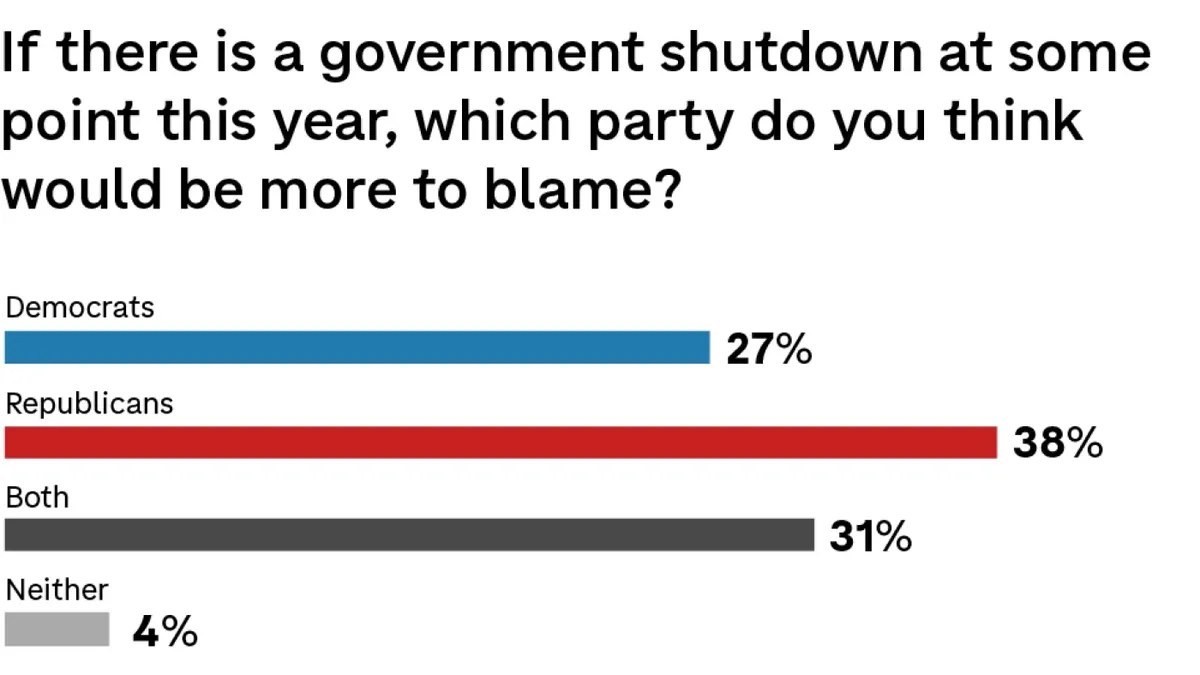
A recent NPR/PBS News/Marist poll has indicated that if the federal government faces a shutdown, a greater percentage of the blame would likely fall on Republicans compared to Democrats. The poll results show that 38% of respondents would attribute responsibility for a shutdown to Republicans, while only 27% would blame Democrats. Moreover, a significant portion, approximately 30%, believes that both parties share equal blame. This sentiment is particularly pronounced among independents, where 40% feel both sides are equally responsible.
The poll highlights a growing frustration among the public regarding the lack of compromise between the two parties. Debra Sudbeck, a 71-year-old independent from Nebraska, expressed her discontent, stating, "Neither one wants to compromise. It's just that Republicans want to do everything they can to antagonize the Democrats, and Democrats want to do everything they can to go against the Republicans." This perspective underscores a broader sentiment that both parties are engaged in a contentious struggle, reminiscent of "two little kids fighting."
As the deadline for a government shutdown looms—set for midnight Tuesday—there is no clear consensus among the parties. Many members of the Democratic base are disillusioned with Senate Majority Leader Chuck Schumer due to a prior last-minute deal made to prevent a shutdown. The poll reveals a divide among Democrats, Republicans, and independents regarding the importance of compromise. While Democrats and independents tend to favor compromise to avert a shutdown, Republicans are more inclined to prioritize standing on principle, even if it leads to a shutdown.
Interestingly, the generational divide on this issue is not as straightforward as it may seem. The survey indicates that both Gen Z and Baby Boomers are more likely to advocate for compromise. In contrast, Millennials and Gen X are more inclined to insist on standing firm on principles.
In addition to the shutdown discussions, the same poll reveals that President Trump's approval rating has reached a new low of 41%, with 53% of respondents disapproving of his performance. This rating marks the lowest point of his current term, although it remains within the margin of error compared to previous ratings this year. A significant factor contributing to Trump's decline in approval is the mere 31% of independents who express approval of his presidency. However, Trump retains strong support from his base, with 87% of Republicans still backing him.
Dave Cole, a 78-year-old Republican from Colorado, defended Trump, likening him to General George Patton, stating, "He may be a son of a bitch, but he's our son of a bitch... he tells you what he's going to do and then he does it." Conversely, others, like Harold Etkin, an independent from Michigan, voiced strong disapproval, calling Trump "the worst president we've ever had." This sentiment raises concerns as Trump’s approval among key demographics, such as Latinos and Gen Z, remains low—only 36% of Latinos and 24% of Gen Z approve of his presidency.
While Trump's approval ratings are concerning, the ratings for Democrats in Congress are even more alarming. Only 25% of the public approves of their performance, while a striking 62% disapprove. In contrast, Republicans fare slightly better with a 35% approval rating and 55% disapproval. Notably, only 19% of independents approve of Democrats, and just 26% approve of Republicans. These approval ratings mirror those from earlier in the year, highlighting a persistent trend of dissatisfaction, particularly among Democrats themselves—only 48% of Democrats express approval of their party's congressional members.
Robert Jenkins, a 59-year-old Democrat from Pennsylvania, criticized his party's leadership, calling them "spineless" and urging them to "fight back" against their opponents. This call for action reflects a growing frustration within the Democratic base, as many look for stronger leadership and a more decisive stance against Republican strategies.
The Marist poll, conducted from September 22 to 26 with a sample size of 1,477 adults, has a margin of error of +/- 3.1 percentage points. Respondents were reached via various methods, including cellphone, landline, text, and online surveys, conducted in both English and Spanish.